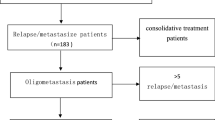Abstract
Background
The advent of effective chemotherapeutic agents for ovarian carcinoma has made radical abdomino-pelvic radiation redundant. Nevertheless, palliative pelvic radiotherapy still has a role in palliating local symptoms. However, its effect on progression-free survival (PFS) may be debated.
Aims
To study the outcome of fractionated palliative pelvic radiotherapy in relapsed ovarian cancers in terms of symptom control and PFS.
Methods
Twenty-three patients of ovarian cancers, heavily pretreated with chemotherapy and with recurrent or residual pelvic masses, were planned for palliative pelvic radiotherapy to the dose of 46–50 Gy in 23–25 fractions in 4.5–5 weeks. Symptom control and outcomes have been analyzed.
Results
Post-radiotherapy, abdominal pain was controlled in 15 out of 17 patients (88.2 %), bleeding per vaginum in all 5 patients and vaginal discharge stopped in 4 out of 5 patients (80 %). On follow-up, of 23 patients, 17 (74 %) had progressive disease post-radiation, and median time to disease progression was 10 months (range 1–49). On univariate analysis, increased PFS was observed in patients who received radiation late in their course of disease, those with serous histology, and with lesser disease bulk in pelvis (≤2 cm) prior to radiation initiation.
Conclusion
Fractionated palliative pelvic radiotherapy is an efficient method for symptom palliation in relapsed ovarian cancers. Patients who are heavily pretreated with chemotherapy and have a small-volume pelvic disease may show a prolonged PFS with addition of pelvic radiotherapy. Indications of radiotherapy, however, need to be defined.



Similar content being viewed by others
References
Ozols RF. Controversies in the management of ovarian cancer. Int J Gynecol Cancer. 1997;7:27–32.
Bristow RE, Tomacruz RS, Armstrong DK, et al. Survival effect of maximal cytoreductive surgery for advanced ovarian carcinoma during the platinum era: a meta-analysis. J Clin Oncol. 2002;20:1248–59.
Eisenhauera EA, Therasseb P, Bogaertsc J, et al. New response evaluation criteria in solid tumours: revised RECIST guideline (version 1.1). Eur J Can. 2009;45:228–47.
Piver MS, Barlow JJ, Lele SB. Incidence of subclinical metastasis in stage I and II ovarian carcinoma. Obstet Gynecol. 1978;52:100–4.
Dembo AJ, Bush RS, Beale FA, et al. Improved survival following abdominopelvic irradiation in patients with a completed pelvic operation. Am J Obstet Gynecol. 1979;134:793–800.
Dinniwell R, Lock M, Pintilie M, et al. Consolidative abdominopelvic radiotherapy after surgery and carboplatin/paclitaxel chemotherapy for epithelial ovarian cancer. Int J Radiat Oncol Biol Phys. 2005;62:104–10.
Fyles AW, Dembo AJ, Bush RS, et al. Analysis of complications in patients treated with abdominopelvic radiation therapy for ovarian carcinoma. Int J Radiat Oncol Biol Phys. 1992;22:847–51.
Raja FA, Counsell N, Colombo N, et al. Platinum versus platinum-combination chemotherapy in platinum-sensitive recurrent ovariancancer: a meta-analysis using individual patient data. Ann Oncol. 2013;24(12):3028–34.
Skliarenko J, Barnes EA. Palliative pelvic radiotherapy for gynaecologic cancer. J Radiat Oncol. 2012;1:239–44.
Choan E, Quon M, Gallant V, et al. Effective palliative radiotherapy for symptomatic recurrence or residual ovarian cancer. Gynecol Oncol. 2006;102:204–9.
Corn BW, Lanciano RM, Boente M, et al. Recurrent ovarian cancer. Cancer. 1994;74:2979–83.
Sorbe B, on behalf of the Swedish-Norwegian ovarian cancer study group. Consolidation treatment of advanced (FIGO stage III) ovarian carcinoma in complete surgical remission after induction chemotherapy: a randomized, controlled, clinical trial comparing whole abdominal radiotherapy, chemotherapy, and no further treatment. Int J Gynecol Cancer. 2003;13:276–8.
Pickel H, Lahousen M, Petru E, et al. Consolidation radiotherapy after carboplatin-based chemotherapy in radically operated advanced ovarian cancer. Gynecol Oncol. 1999;72:215–9.
Nagai Y, Inamine M, Hirakawa M, et al. Postoperative whole abdominal radiotherapy in clear cell adenocarcinoma of the ovary. Gynecol Oncol. 2007;107:469–73.
Hoskins PJ, Le N, Gilks B, et al. Low-stage ovarian clear cell carcinoma: population-based outcomes in British Columbia, Canada, with evidence for a survival benefit as a result of irradiation. J Clin Oncol. 2012;30:1656–62.
Rai B, Bansal A, Patel FD, et al. Radiotherapy for ovarian cancers—redefining the role. Asian Pac J Cancer Prev. 2014;15(12):4759–63.
Mahantshetty U, Jamema S, Engineer R, et al. Whole abdomen radiation therapy in ovarian cancers: a comparison between fixed beam and volumetric arc based intensity modulation. Radiat Oncol. 2010;5:106.
Author information
Authors and Affiliations
Corresponding author
Ethics declarations
Conflict of interest
All authors declare that they have no conflict of interest.
Ethical standard
All procedures followed were in accordance with the ethical standards of the responsible committee on human experimentation (institutional and national) and with the Helsinki Declaration of 1975, as revised in 2008 (5).
Informed Consent
Since this is retrospective study, formal consent was not required.
Animals Rights
There are no ethical issues with animal subjects. This article does not contain any studies with animals performed by any of the authors.
Additional information
Dr. Anshuma Bansal is a Assistant Professor, MD of Radiation Oncology at PGIMER Chandigarh; Dr. Bhavana Rai is a Assistant Professor, MD of Radiation Oncology at PGIMER Chandigarh; Dr. Shikhar Kumar is a Junior Resident, MD of Radiation Oncology at PGIMER Chandigarh; Dr. Vanita Suri is a Professor and Head of Department, MD of Gynecology at PGIMER Chandigarh; Dr. Sushmita Ghoshal is a Professor and Head of Department, MD of Radiation Oncology at PGIMER Chandigarh.
Rights and permissions
About this article
Cite this article
Bansal, A., Rai, B., Kumar, S. et al. Fractionated Palliative Pelvic Radiotherapy as an Effective Modality in the Management of Recurrent/Refractory Epithelial Ovarian Cancers: An Institutional Experience. J Obstet Gynecol India 67, 126–132 (2017). https://doi.org/10.1007/s13224-016-0926-7
Received:
Accepted:
Published:
Issue Date:
DOI: https://doi.org/10.1007/s13224-016-0926-7




